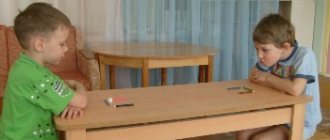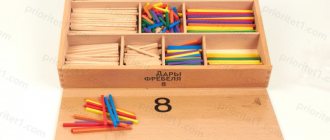What are the requirements for the position of a teacher? Who can work as a teacher
The teacher is often one of the first “strangers” adults with whom the child interacts. Therefore, he must meet certain requirements, regularly develop his skills and confirm his qualifications every 5 years.
In addition to developed professional and personal qualities, the teacher should not have an active criminal record or protracted mental illness.
Professional skills
The activities of educators are regulated by the state professional standard for teachers. According to it, a specialist must have a secondary or higher pedagogical education; another option is a diploma from an institution of additional professional education. For training, it is important to choose a program developed in accordance with professional standards with a certain required number of academic hours. It may be called “Pedagogy and methods of preschool education,” as in ABiUS.
The teacher must understand child psychology, developmental psychology, the theory and methods of raising children of primary preschool age.
However, it is not enough to acquire knowledge; you must learn to apply it. For example, a professional must be able to determine the psychological state of a child and identify his needs.
An additional advantage in employment will be given to a teacher who has studied speech therapy pedagogy in depth or has mastered non-standard pedagogical methods, for example, Montessori. Also of great importance is knowledge of the basics of special pedagogy, which concerns children with disabilities. Since increasingly, kindergartens are becoming incorporated, which implies joint education of children with different abilities.
Personal qualities
Each institution usually has local requirements according to which managers select candidates. At the same time, it is difficult to say where the requirements for teachers are more stringent - in public kindergartens or in private ones.
Employers typically expect a childcare provider to:
- sociable in order to successfully find an approach to children and their parents
- friendly so that children quickly gain trust in a stranger
- with a positive mindset to cope with the complexities of a difficult profession
- caring and attentive to children, so that parents calmly trust their child’s teacher
- creative to come up with interesting activities and holidays
- inquisitive, to explore the world with children and enjoy discoveries with them
- stress-resistant to avoid emotional burnout and excessive emotions when dealing with parents or disobedient children
- aimed at development, so that the teacher has a desire to improve their skills
Who is suitable for working as a teacher?
Most often, a person gets the idea of becoming a teacher when he notices his warm attitude towards children. But as he gets acquainted with the specifics of the profession, he discovers that love for children and the ability to work with them are two different things. Therefore, you should initially check whether he should go into teaching. The qualities described below characterize a person who is ready to become a teacher:
- You are responsible and know how to evaluate your strengths.
- You are attentive to details: in people's behavior and in the environment.
- You are not afraid of unexpected situations and can react calmly.
- You are ready to immerse yourself in work and constantly develop in your chosen direction.
- You know how to control yourself and your emotions.
- You have high emotional intelligence and empathy.
- You understand all the risks of your profession
Professional excellence
It is a fact that teaching activities in kindergarten requires a lot of patience. Some believe that only someone who has innate special abilities can become a teacher, but this is a very controversial issue. The special knowledge, professional skills and abilities needed by the teacher can be acquired and developed.
Education does not consist of annoying teachings and endless lectures: with their monotony, they will only cause boredom and melancholy in preschoolers. The professional skill of a preschool teacher is manifested in the understanding that the most effective are not only verbal methods of education, but to a much greater extent good and moral actions: helping others, showing empathy and mercy, etc. Therefore, the teacher needs to develop his pedagogical experience in being able to It is easy to organize such activities for children.
To teach children, the teacher must have deep knowledge in various areas
The teacher must have in-depth knowledge of:
- pedagogy
- developmental psychology
- basic life safety and first aid
- ethics and aesthetics
- principles and content of the organization of preschool education.
The preschool teacher must:
- know and be able to apply methods of teaching and developing children
- be able to organize and activate the cognitive activity of students.
Among the professionally important qualities of a teacher, experts highlight:
- mastery of modern methods and technologies in the field of teaching and raising children
- broad erudition
- pedagogical intuition
- high level of intelligence
- highly developed moral culture.
Main cast
We usually call a teacher a teacher.
The responsibilities of this employee include:
- Acceptance of wards in the morning at the kindergarten and return in the evening. At the same time, if a parent is late from work by the end of a specialist’s shift, the latter must still wait with the baby for mom or dad, regardless of the time. From the moment the child is handed over to the teacher, he bears full responsibility for the life and health of the child;
- Conducting developmental activities according to age group. The necessary methodological basis and training plan are being developed, according to which the children study throughout the year;
- Visiting interactive exhibitions and excursions;
- Organization of holidays and musical games together with the artistic director;
- Daily walks with pupils;
- Preventive health activities together with a physical education teacher;
- Help children with everyday issues. The little one can freely ask for help in changing clothes, visiting the toilet, washing hands, etc.
- Coordination of vaccinations with the child’s legal representatives. Please note that only the parent decides whether to vaccinate their child or not!
With good staffing, there are two teachers per group, working in shifts. The first is from 7 a.m. to 2 p.m., the second from 12:00 to 7:00 p.m., respectively. During the shift change (from 12:00 to 14:00), employees discuss together what has already been done according to the pedagogical plan, what is to come, which children should pay special attention to, and much more.
Many kindergartens additionally have a junior teacher or, in other words, a nanny. She helps the main teacher:
- Serve food and drinks during meals;
- Clean tables after meals, wash dishes;
- Monitor the hygiene of the wards;
- Clean and ventilate rooms twice a day;
- Change bedding;
- Monitor the cleanliness of the walking area of the preschool educational institution;
- Changing children's clothes.
The music director organizes games and various events with musical accompaniment. Helps with theatrical and holiday productions.
Its main task is to develop musical taste, hearing and voice among students.
What education is needed to work as a teacher?
You can study to become a teacher at a special college, university or in centers of additional professional education.
People are admitted to college after the ninth and eleventh grades of school. College students spend a lot of time on practical preschool skills. They undergo internships in kindergartens and can gain useful experience by the age of 18-20.
At the university, a student can go to the Faculty of Pedagogy and receive a specialty as an educator. Most diplomas labeled “preschool education” are well received by future employers. Over the course of 4-5 years, students deeply study the basics of pedagogy, psychology and health, and also become acquainted with new trends in education.
Without pedagogical education
If your first higher education does not concern pedagogy, you can become a teacher by completing a professional retraining program at additional vocational education institutions and receive a standard diploma in 2 or 4 months without interrupting your job.
To work as a junior teacher or assistant, appropriate vocational training programs with obtaining a certificate and obtaining qualifications are sufficient. All these programs are available in ABiUS.
- Retraining program “Preschool teacher”
- Professional training program “Junior teacher”
- Vocational training program "Teacher's Assistant"
Once you have received your specialized education, you can deepen your knowledge through advanced training programs.




